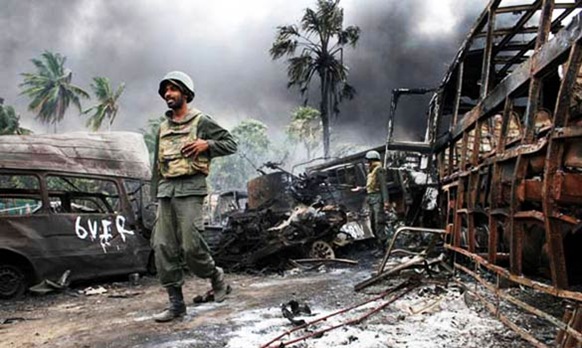
The International Committee of the Red Cross (ICRC) has been forced to suspend the distribution of emergency supplies to as many as 300,000 people displaced by the Sri Lankan Army’s victory over the Tamil Tigers after the Government blocked access to aid camps.
Fears have been growing over the welfare of those forced to flee the conflict zone – many of whom are sick or suffering from battlefield injuries – after tight restrictions were placed on the UN and other agencies trying to administer aid.
Urgently needed supplies of food and clothing had been suspended after access to the camps was restricted by the Government, an ICRC spokesperson told The Times this morning.
The ICRC had been the only neutral aid organisation allowed inside the conflict zone. It had between 20 and 25 staff on the ground in the northeastern region where the Tigers made their last stand over the weekend but has not heard from them since last week.
The blocking of access to the battle zone has raised fears for the fate of those civilians too sick or injured to flee the area by foot.
Those who escaped had to wade through a mine-strewn lagoon, journeying several days to reach camps that are struggling to cope.
Accounts of conditions inside the camps — gained from testimony recorded covertly by aid workers — and the journey to them are horrifying.
Preema, a Tamil woman, arrived at the 400-hectare (990-acre) Menic farm camp on Sunday. She had left Mullaivaikal, the centre of the fighting where the Tigers made their final stand, after being shelled heavily.
She set out with her husband, mother and two children, to wade through the Nandikadal lagoon — a waterway strewn with mines — in a desperate attempt to reach safety.
There were deep craters where the lagoon had been bombed and people often drowned, she said. Her mother died in the lagoon. A man offered to carry her ten-year-old daughter. Preema never saw them again. Her husband was taken away by government troops after admitting that he had worked for the Tigers. He was stopped at a checkpoint in Oomanthai where refugees are being forced to strip before being allowed to pass.
“Everything is lost,” said Preema, holding her son, seven. “Please help me find my daughter. Not knowing anything is making me crazy.”
Inside one camp, Nandani, 76, described being forced to stand for up to five hours a day queueing for food.
Kala, a middle-aged woman, spoke about the constant indignities of her new life. “I do not have underwear. I am unable to use the Kotex that the Red Cross handed out,” she said, holding a packet of sanitary towels she had been given before the organisation’s access to the camp was restricted.
Kothai, another woman, said: “There is a bad distribution system within the camp. Every time it is the same people that get. Men crowd around and push the women and children aside.”
Government officials did not answer requests for comment. Access for aid agencies to another 200,000 refugees already in the internment camps — which the Government call “welfare villages” — has been severely restricted since Sunday, preventing the administration of basic care.
Ban Ki Moon, the UN Secretary-General, is due to travel in Sri Lanka on Friday to offer help to rebuild the ravaged northeast of the country and urge the Government to reach out to the Tamil population.
“These people have endured one of the cruellest military sieges of modern times — daily shelling over several months,” an international aid worker said. “They need urgent help.”
There are fears that the camp populations — especially children — will be hit by contagious diseases. Chickenpox, hepatitis A and dysentery outbreaks have been reported. Medical facilities are said to be woefully inadequate.
There are also concerns that the suffering will radicalise previously moderate Tamils, especially amongst the community’s international diaspora, which had been a key source of funding for the Tigers.
Most Sri Lankans are delighted by the defeat of the Tigers, a terrorist force that fought for 26 years for an independent Tamil homeland, propagating a war that left at least 70,000 dead. Many Tamils were against the rebels after they recruited child soldiers and terrorised their own people.
There were doubts over the sincerity of President Rajapakse’s pledge to build bridges between the Sinhalese and Tamil minority. He has seldom brooked dissent, his opponents say.
(For updates you can share with your friends, follow TNN on Facebook and Twitter )
